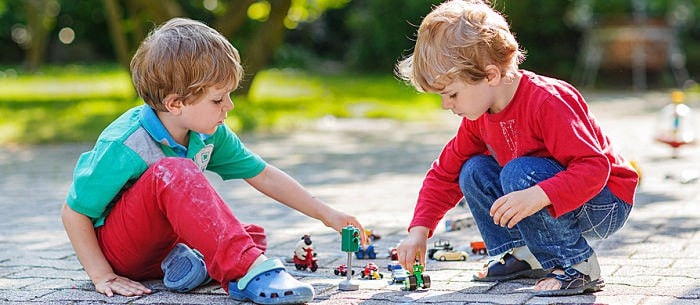Has your timid toddler has turned into a 5-year-old social butterfly? That’s no surprise. Where he was once hiding behind your legs at the park, he’s now making new friends everywhere he goes. As your child starts school and broadens his social circle, he’s honing his people skills and hitting important 5-year-old milestones.
And read
our guide to developmental milestones for kids
.
What You Should Expect
Each child is different, but generally speaking, chattiness and friend-pleasing are hallmarks of a child’s healthy social being. “This is a delightful age,” says Betsy Brown Braun, a child development and behavior specialist and author of “You’re Not the Boss of Me.” At age 5, your child has developed a group of friends he regularly plays with and will start showing concern and empathy for others. He’ll start to consider other people’s points of views in everyday situations, and if his friend is hurt, he’ll show sympathy toward them and will apologize if necessary if he’s at fault.
Your kid is also using his imagination more and more. He’s entering a phase where he processes his world through play, according the U.S National Library of Health. He’ll often prefer the more imaginative world of make-believe over reality, and will dream up fantastic worlds and silly scenarios. It’s a fun and playful time for you and your child alike.
Your 5-year-old should also begin demonstrating independence. He will want to do just about everything on his own and will begin to questions others — even Mom and Dad. He will want to pour his own milk, pick out his own clothes or go on a play date without mom. Let him spread his wings when you can, as long as he can practice his independence safely.
Creating Successful Social Skills
For many kids, social development suffers because of one simple thing — they never get time to practice those skills. “Parents need to create a context to learn,” Braun says. “Experience is the best teacher. We need to model good social behaviors to our children and then create opportunities for them to practice those skills.”
Play dates are an excellent way to develop vital social skills. As children play together, they learn to connect with their friends, share, adapt to new surroundings and exercise independence. “Decide ahead of the play what activities will be played,” says Susan Diamond, a licensed speech-language pathologist and author of the book “Social Rules for Kids.” “Make sure turn-taking is occurring.” Above all, make play dates full of fun, so your child can feel good about his social success and want to repeat the behaviors next time.
“The importance of play in developing social skills cannot be overestimated,” says Diamond. “In fact, a child learns social interaction through exploration, observation and play.” But play dates aren’t your only option. Diamond suggest a number of ways to help your grade-schooler achieve these important 5-year-old milestones. Play turn-taking games such as rolling a ball back and forth. Whoever has the ball gets to take their turn telling part of a story. The next person who gets the ball gets to narrate another part of the tale. Board games or sports are also excellent ways to promote turn-taking in young children.
Some kids are innately the life of the party, but others are slow to warm, thriving instead on quiet environments and one-on-one interactions. No matter what his temperament might be, it’s important to keep this in mind when you’re trying to help your child develop their social skills. “Often parents are thrown off by this,” says Braun. “It’s critical we keep in mind who and how your child is. Be aware of their personality and temperament.” Follow their lead to help them succeed in the intricate world of friendship.
And check out this
Overview of Milestones for 5 Year Olds
.
Kimberly DeMucha Kalil is a freelance journalist and software consultant living in Southern Arizona with her husband and two children. Most days you can find her on Twitter @kimbely_kalil talking about how wonderful her children are.




